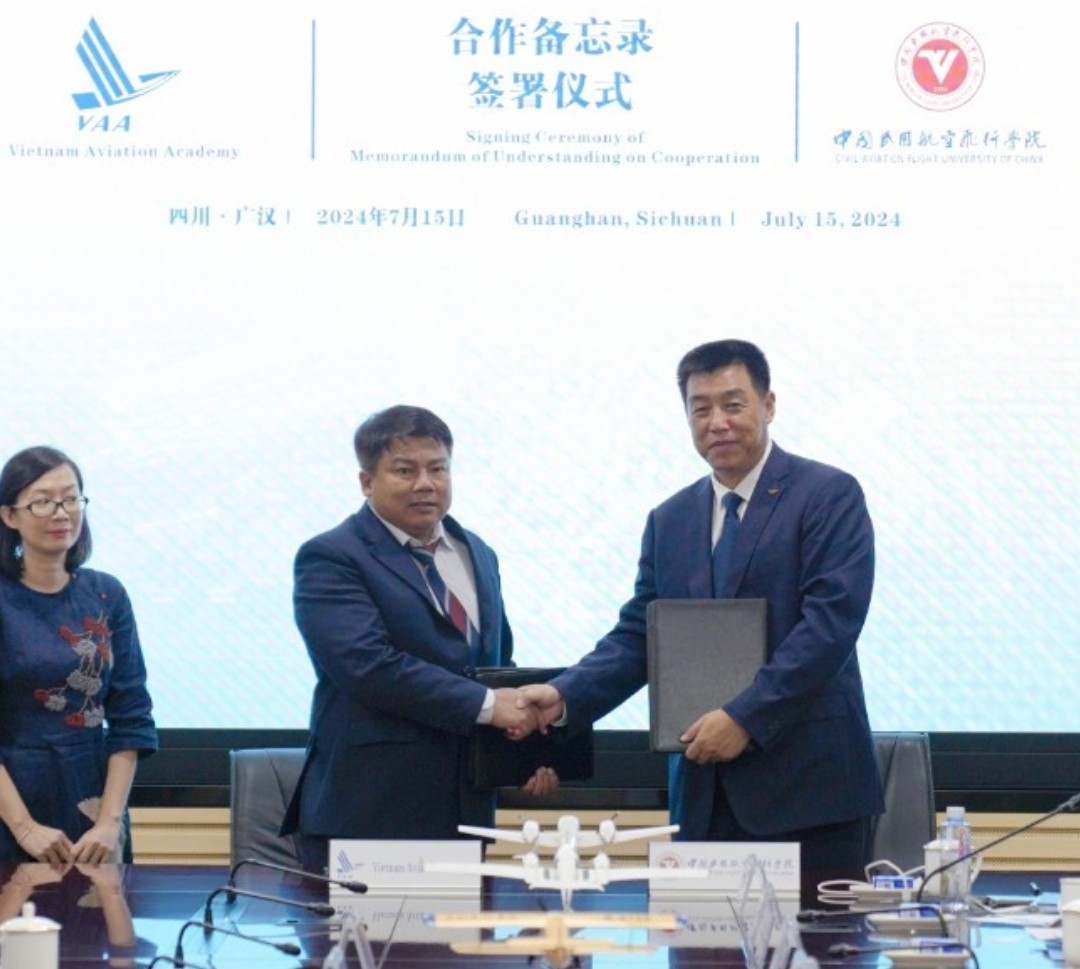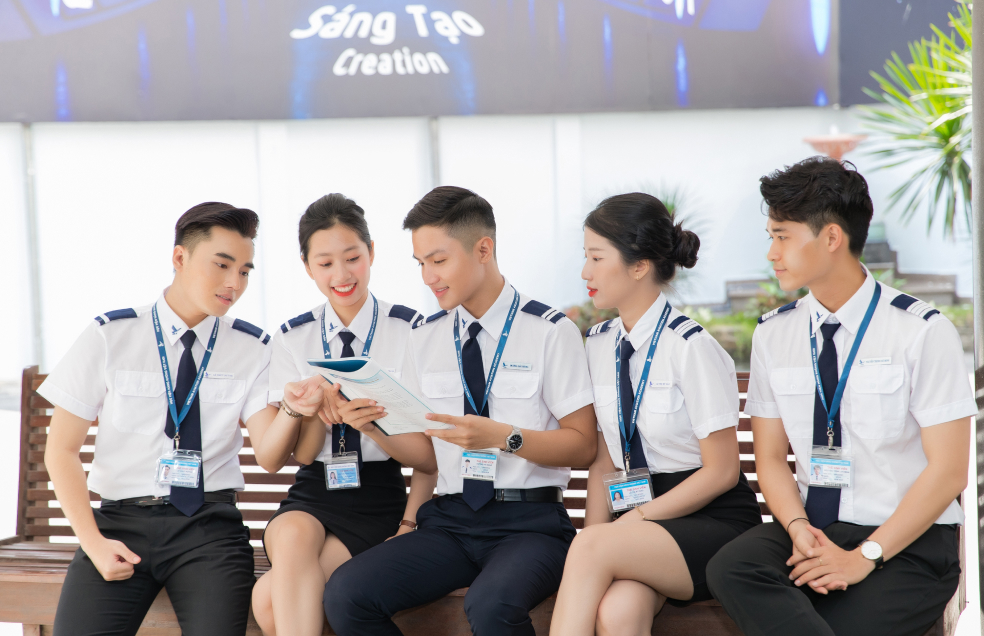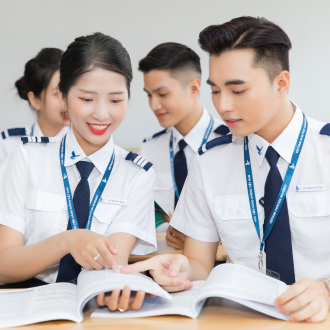EXPLORING THE MEKONG DELTA: A TWO-DAY ONE-NIGHT JOURNEY
On April 21-22, 2025, nearly 200 students from the 18th Cohort of the Faculty of Tourism and Aviation Services embarked on a journey to explore the Mekong Delta with Hai Van Travel. This was not just an ordinary sightseeing trip but an opportunity for practical learning, helping students apply their academic knowledge to professional practice. Under the guidance of Mr. Nguyen Phuoc Hien (Tour Introduction supervisor) along with faculty members including Mr. Truong Dai Loi, Ms. Vu Thi Thu Huong, Ms. Nguyen Hanh Nguyen, and Mr. Nguyen Anh Loi, students experienced the unique cultural and historical values of this region. Hai Van Travel’s tour guides, with their rich experience and extensive knowledge, provided valuable information, helping students gain deeper insights into local culture and history while learning professional tour guiding skills.
Day 1: Cao Lanh, Dong Thap – Chau Doc, An Giang – Can Tho
The journey began at 4:00 AM in Ho Chi Minh City, when the fleet of buses picked up students at the Vietnam Aviation Academy. Despite the early hour, an atmosphere of excitement and enthusiasm prevailed as students checked in and received tour guidebooks. The faculty and Hai Van Travel representatives shared brief remarks about the purpose and significance of the trip as well as necessary precautions. At exactly 4:00 AM, the group officially departed, beginning their journey to explore the Mekong Delta with its many attractive destinations.

FTAS students before departure time
After more than an hour of travel, the group stopped at MEKONG REST STOP TIEN GIANG for breakfast. This is a modern, spacious rest stop with green spaces and many amenities for tourists. Here, students enjoyed breakfast with traditional dishes such as Hu Tieu Nam Vang (Cambodian-style noodle soup), banh mi, banh canh (thick rice noodle soup), and iced coffee. Breakfast not only helped students energize for a long day of exploration but also provided an opportunity for them to chat and get acquainted, creating a friendly atmosphere from the beginning of the trip.

FTAS students enjoying breakfast at Mekong Rest Stop in Tien Giang
“Although we had to wake up early, we were all very excited. The breakfast at the rest stop was delicious and nutritious, giving us enough energy for the long day ahead,” shared a student from Class 01.
Cao Lanh, Dong Thap
After breakfast, the group continued their journey to Cao Lanh, Dong Thap. The first stop was the Do Cong Tuong ancestral temple on Le Loi Street, Cao Lanh City, Dong Thap Province. This is an important historical and cultural relic of Dong Thap Province, honoring the great contributions of Mr. and Mrs. Do Cong Tuong – pioneers who developed the Cao Lanh region and contributed to the area’s development since the 19th century.
The temple was built with traditional Southern Vietnamese architecture, including many structures such as the main hall, stele house, garden, and auxiliary buildings. The highlight is the main hall with its solemn altar, where the tablets and portraits of Mr. and Mrs. Do Cong Tuong are placed. Surrounding the temple is a spacious courtyard with many trees, creating a peaceful, airy space.

FTAS students visiting and studying at the shrine of Mr. and Mrs. Do Cong Tuong – Cao Lanh City, Dong Thap Province
Here, the tour guide introduced in detail the life, career, and contributions of Mr. and Mrs. Do Cong Tuong in pioneering, building, and developing the Cao Lanh region. Students also learned about traditional customs and rituals related to ancestral worship and honoring those who contributed to the homeland – a beautiful aspect of Vietnamese spiritual culture.
“Through visiting the Do Cong Tuong ancestral temple, I not only learned more about the history of Cao Lanh but also felt the gratitude and respect of local people toward their benefactors. This is a beautiful cultural value that we need to preserve and promote,” shared a student from Class 02 after the visit.
Chau Doc, An Giang
Leaving Cao Lanh, the group traveled to Chau Doc, An Giang – a region famous for its diverse religious cultures and rich cuisine. Here, the group stopped to enjoy lunch with traditional Mekong Delta dishes such as braised fish, sour soup with dien dien flowers, and many other local dishes. Lunch not only helped students refuel but also provided an opportunity to learn about local food culture, an essential part of the tourism industry.

FTAS students visiting and studying at the complex of historical sites including Ba Chua Xu Temple, Tay An Pagoda, and Thoai Ngoc Hau Tomb
In the afternoon, the group visited three famous sites in Chau Doc:
Ba Chua Xu Temple: Located on Sam Mountain, Ba Chua Xu Temple is one of the most famous spiritual sites in the Mekong Delta, attracting millions of pilgrims each year. The unique architectural structure is deeply influenced by Eastern style with a dominant red color symbolizing luck and prosperity. Here, the tour guide introduced the history, spiritual cultural significance, and distinctive customs and rituals associated with the worship of Ba Chua Xu.
“I was very impressed with the spiritual atmosphere at Ba Chua Xu Temple. The way local people express their reverence and faith gave me a better understanding of Vietnamese folk beliefs. This is very important when working in the tourism industry, especially when guiding international tourists,” shared a student from Class 03.
Tay An Pagoda: This national historical and cultural relic is a symbol of architectural cultural exchange between Vietnam and India. The pagoda was built in 1847 with a unique architectural style combining Indian and Southeast Asian elements. The student group toured various structures within the pagoda complex including the main hall, bell tower, ancestral house, and especially the Relics Stupa – where Buddha’s relics are preserved.
“Tay An Pagoda is clear evidence of cultural exchange between different ethnicities. The unique architecture of the pagoda showed me the diversity and richness in the spiritual culture of the Mekong Delta people. I think this is a very attractive destination for tourists wanting to learn about Buddhism and religious architecture in Vietnam,” remarked a student from Class 04.
Thoai Ngoc Hau Tomb: A representative architectural work of the Nguyen Dynasty period, this is the resting place of Thoai Ngoc Hau – an official who greatly contributed to pioneering An Giang province and building two famous canals: Thoai Ha Canal and Vinh Te Canal. The tomb was built in traditional architectural style with many intricate details, demonstrating the craftsmanship of artisans of that time. Here, students learned about the life and career of Thoai Ngoc Hau and his wife – Mrs. Chau Thi Te, who made significant contributions to completing the Vinh Te Canal after his death.
Gala Dinner and Night Exploration of Can Tho
After a long day of exploration, the group traveled to Can Tho city – the heart of the Mekong Delta. On the evening of April 21, 2025, a Gala Dinner with the theme “Colors of the Mekong Delta” was held at Ninh Kieu 2 Can Tho banquet hall. The venue was decorated with Mekong Delta motifs, creating an atmosphere both elegant and familiar.

FTAS students participating in a Gala Dinner at Ninh Kieu 2 Banquet Hall in Can Tho
The program began at 7:00 PM with a speech by Mr. Nguyen Phuoc Hien about the educational significance of the trip. Hai Van Travel representatives awarded 20 scholarships, each worth 1 million VND, to students with outstanding achievements and perseverance.
The opening of the dinner featured an emotional recap video, summarizing the memorable moments of the first day of the trip. The authentic, vivid images of the visited sites, radiant smiles, and interesting experiences recalled the memories just experienced, creating special emotions for everyone. The dinner proceeded with a rich menu of traditional Mekong Delta dishes. Interspersed were interactive activities, games, and a costume show. The program also included birthday celebrations for students with birthdays in April.
The Gala ended at 9:00 PM. Afterward, the entire group took group photos, capturing moments of unity and friendship strengthened through the trip.
The journey continued with a night exploration of Can Tho. Students strolled along Ninh Kieu Wharf – a symbol of Can Tho, admiring the romantic river scenery under shimmering lights, enjoying characteristic street foods at stalls along the wharf, and participating in cultural and entertainment activities there. Some groups chose to explore Can Tho night market with its vibrant, colorful atmosphere, offering everything from clothing and souvenirs to specialty foods. This was not only an opportunity for students to shop for souvenirs but also to learn more about the consumer culture and trade of local people.
At 11:00 PM, the groups returned to the hotel to rest and prepare for the second day’s journey.

FTAS Hotel and Restaurant Management students practicing reception, restaurant, and kitchen operations at the four-star Ninh Kieu 2 Hotel in Can Tho
Despite having experienced a long day with many activities, excitement and enthusiasm were still evident on each student’s face. The experiences of the first day had left them with many emotions and beautiful memories, creating anticipation for new discoveries the next day.
Day 2: Cai Rang Floating Market – Tien Giang (Phung Islet – Lan Islet – Vinh Trang Pagoda)
Cai Rang Floating Market
Early on the second morning, the group woke up at 3:30 AM to prepare for a visit to Cai Rang Floating Market – one of the largest and most famous floating markets in the Mekong Delta. At exactly 4:00 AM, the group moved to Ninh Kieu Wharf and boarded boats to begin exploring the floating market.
Students were taken into the bustling space of the floating market with hundreds of boats of various sizes gathering to trade all kinds of goods, mainly agricultural products and fruits. In particular, the students learned from the guide about the unique cultural feature of the floating market: the “beo” pole – a long pole erected on boats with various goods hung on it to advertise the products being sold. This is a traditional, unique advertising method found only at Mekong Delta floating markets.

FTAS students visiting and studying at Cai Rang Floating Market
“Cai Rang Floating Market was the destination I looked forward to most on this trip. Although we had to wake up very early, it was completely worth it. Witnessing firsthand the trading on the river at dawn, hearing the calls of vendors, the bargaining, and feeling the vibrant rhythm of life on the water gave me invaluable practical experiences,” shared a student from Class 04.
The guide also introduced in detail the trading methods, daily life of people on the river, and the changes in the floating market over time, helping students gain a deeper understanding of the economic and cultural life of local people.
After visiting the floating market, the group returned to the hotel for breakfast, rest, and to prepare their luggage. The check-out process went quickly and smoothly thanks to the careful preparation of the organizers and the cooperation of the students.
Tien Giang – Phung Islet
At exactly 8:00 AM, the group departed from Can Tho to Tien Giang. The first destination of the second day was Phung Islet Tourist Area – a place associated with the name of the Coconut Monk (Nguyen Thanh Nam). Phung Islet is a small island in the middle of the Tien River, located in Tan Thach Commune, Chau Thanh District, Ben Tre Province.

FTAS students visiting and studying at Con Phung (Phung Islet)
Here, students visited the memorial site of the Coconut Monk, learning about his life and contributions to the local community. Nguyen Thanh Nam, also known as the Coconut Monk, founded a unique religious community combining Buddhism, Christianity, and folk beliefs, while building a self-sufficient community on the islet.

FTAS students visiting and studying at Con Phung
“The story of the Coconut Monk and how he built a self-sufficient community on Phung Islet truly inspired me. This is a very successful community tourism model, combining cultural and historical values with nature conservation,” remarked a student from Class 02.

FTAS students visiting and studying at Con Phung
Students also toured unique architectural structures on the islet such as the communal house, church, temple, and especially participated in experiential activities like making coconut candy, weaving coconut leaves, and rowing sampans. These activities were not only entertaining but also helped students better understand the cultural life and daily activities of Mekong Delta people.

FTAS students visiting and studying at Con Phung
The group’s lunch took place at a restaurant on Phung Islet with a rich menu of Mekong Delta specialties such as fried elephant ear fish, duck hotpot, and more. The airy restaurant space with views of the river created an interesting and memorable lunch.
Lan Islet
After lunch, the group moved to Lan Islet – a small island in the middle of the Tien River. A memorable experience at Lan Islet was enjoying seasonal Mekong Delta fruits in the lush green orchard space. Students were led into lush orchards, witnessing and tasting specialty fruits such as cat mango, red dragon fruit, crispy guava, and longan.

FTAS students visiting and studying at Con Lan (Lan Islet)
Especially, while enjoying fresh fruits, students were immersed in the cultural space of Don Ca Tai Tu (Southern Amateur Music) – an intangible cultural heritage recognized by UNESCO. A group of local artists in traditional costumes performed characteristic melodies such as “Da Co Hoai Lang” and “Luu Thuy Truong.”
“Hearing Don Ca Tai Tu live for the first time, I was truly captivated by the undulating sounds, sometimes as gentle as flowing streams, sometimes as deep as the hearts of Mekong Delta people. The way the artists expressed emotions through each note helped me understand more about the soul and character of the local people,” shared a student from Class 05. Here, students experienced riding sampans – the traditional transportation of Mekong Delta people – winding through small canals under the shade of green trees.
“Riding a sampan through the water coconut groves is an unforgettable experience. I felt very close to nature and the local culture. Especially, the way local people transform their daily activities into attractive tourism products gave me many valuable lessons about sustainable tourism development,” shared a student from Class 04.
Students also visited a traditional coconut candy workshop, learning about the handmade coconut candy process from selecting coconuts, grating coconut meat, cooking sugar to packaging products. Many students tried making coconut candy under the guidance of local people and bought products as souvenirs.
Vinh Trang Pagoda
The final destination of the journey was Vinh Trang Pagoda – one of the oldest and most beautiful pagodas in the Mekong Delta. The pagoda stands out with its unique architectural style combining Vietnamese, Khmer, Chinese, and Western influences. Students were introduced by the guide to the history, spiritual cultural significance, and distinctive architectural features of the pagoda such as the triple gate, main hall, and large Buddha statues in the complex.

FTAS students visiting and studying at Vinh Trang Pagoda
“Vinh Trang Pagoda was the perfect ending to our trip. The unique architecture of the pagoda and the peaceful spiritual space left a deep impression. I believe this will be a must-visit destination when introducing the Mekong Delta to tourists in the future,” shared a student from Class 04.
This was also an opportunity for students to learn about Southern Buddhism and the role of pagodas in the spiritual life of Mekong Delta people. Many students took time to admire the peaceful beauty of the pagoda, take souvenir photos, and participate in spiritual activities such as burning incense and praying for peace and luck.
After visiting Vinh Trang Pagoda, the group began their journey back to Ho Chi Minh City, concluding the meaningful and enriching trip. On the bus, the guide organized small activities such as karaoke, sharing feelings about the trip, and giving souvenirs, creating a joyful, bonding atmosphere.

Beautiful memories of FTAS students during their 2-day-1-night journey in the Mekong Delta
The two-day, one-night journey exploring the Mekong Delta provided students with valuable practical experiences about the culture, history, and life of Mekong Delta people. Through observing the work of professional tour guides and directly experiencing tourism products, students gained deeper insights into the tourism industry and the skills necessary to succeed in the profession. Especially, the trip contributed to building team spirit, friendships, and creating memorable experiences among students. The knowledge and skills gained from the trip will be valuable assets for them in their learning journey and career development in the future.
Hai Van Travel is honored to accompany the students of the Faculty of Tourism and Aviation Services on this learning and exploration journey, and commits to continue providing quality educational tour programs, contributing to training high-quality human resources for Vietnam’s tourism industry.
News: Loina – FTAS
Photo: Hai Van Travel

Vietnam Aviation Academy compiled national standards on ground radio navigation aid systems


What is a UAV? What is a drone? What is the difference between UAV and drone?


VIETNAM AVIATION ACADEMY HAS SIGNED A COOPERATION AGREEMENT WITH CIVIL AVIATION FLIGHT UNIVERSITY OF CHINA


Workshop on Developing a Strategic Plan for the Vietnam Aviation Academy: Resolutely Realizing Key Strategic Objectives


The Impact of Artificial Intelligence on the Global Economy: An Ongoing Revolution






